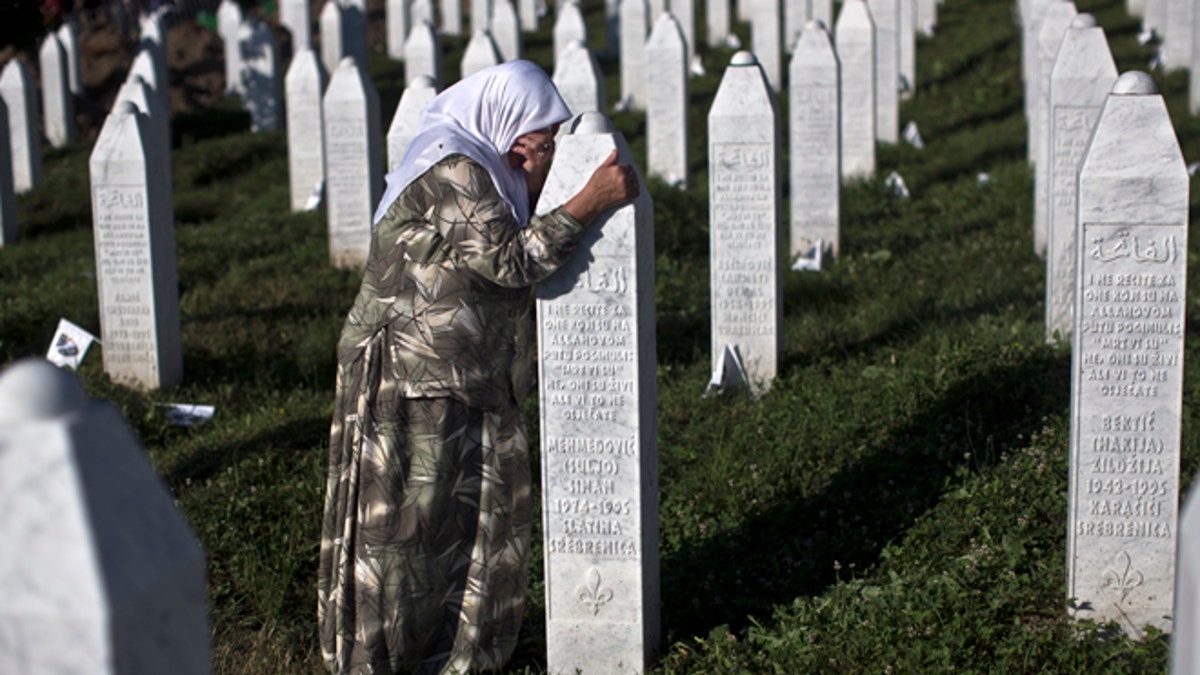
July 11, 2015: A woman weeps as she visits the grave of a family member at the Potocari memorial complex near Srebrenica, 94 miles northeast of Sarajevo, Bosnia and Herzegovina. (AP Photo/Marko Drobnjakovic)
SREBRENICA, Bosnia-Herzegovina – Tens of thousands of people poured into Srebrenica Saturday, by buses, cars, motorcycles and on foot, to mark the 20th anniversary of Europe's worst massacre since the Holocaust and to attend the funeral of 136 newly found victims.
Dozens of foreign dignitaries — including former U.S. President Bill Clinton, Turkish Prime Minister Ahmet Davutoglu, Britain's Princess Anne and Jordan's Queen Noor — came for a ceremony mourning the 8,000 Muslim men and boys killed in the eastern Bosnian town of Srebrenica by Bosnian Serb troops. The crime was later defined as genocide by two international courts.
At the end of the ceremony families will lay the remains of 136 victims to rest at a memorial center next to the graves of over 6,000 previously found in mass graves.
During the 1992-95 war, the United Nations declared Srebrenica a safe haven for civilians. But on July 11, 1995, Serb troops overran the Muslim enclave. Some 15,000 men tried to flee through the woods toward government-held territory while others joined the town's women and children in seeking refuge at the base of the Dutch U.N. troops.
The outnumbered Dutch troops could only watch as Serb soldiers rounded up about 2,000 men for killing and later hunted down and killed another 6,000 men in the woods.
Bosnian Serbs deny the killings were "genocide" and their leader, but Serbian Prime Minister Aleksandar Vucic came to represent Serbia at the commemoration. Although the crowd booed his arrival, Srebrenica widows and mothers welcomed his presence.
"Only on truth we can build a future. You cannot deny the truth," Kada Hotic, who lost her son and husband in the massacre, told Vucic.
"All of my family members are here under these tombstones. This cannot be denied. Because of our future, we need good relations," she added.
So far, remains of some 7,000 victims have been excavated from 93 graves or collected from 314 surface locations and identified through DNA technology. None of the 136 bodies to be laid to rest Saturday are complete.
This week, Russia vetoed a proposed U.N. Security Council resolution condemning the Srebrenica crime on request of Serbia because it contained the word "genocide." In return, Srebrenica organizers withdrew an invitation to the Russian ambassador for Saturday's ceremony.
For three days, nearly 10,000 people retraced in reverse the march taken by those fleeing Srebrenica men and arrived Friday evening, in time to help families carry the 136 coffins from the former U.N. base, across the road to the memorial center.
Resid Dervisevic, who survived the escape through the forests in 1995, said each year he takes part in the march and it hurts. "In my dreams I talk to my brother and my nephews and my friends who perished on this path," he said.
Some 500 bikers who arrived for the ceremony turned their engines off and the valley fell into silence. One tattooed, muscular biker quietly watched the river of coffins passing from hand to hand. From underneath his cool black sunglasses, a tear rolled down his cheek.
The 1992-95 war in Bosnia, pitting Christian Orthodox Serbs against Bosnian Muslims and Croatian Catholics, left more than 100,000 people dead and millions homeless. The Serbs, who wanted to remain in the Serb-led Yugoslavia, fought against the secession of Bosnia and Croatia from the former federation.
The conflict ended with a U.S.-brokered peace agreement that divided the once ethnically mixed country in two ministates — one run by the Serbs, the other shared by the Bosniaks and Croats.








































